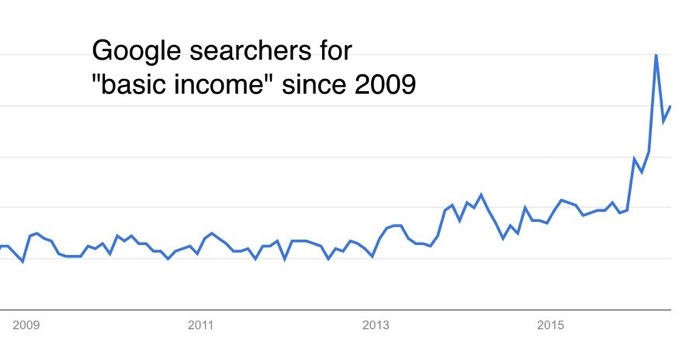Many would disagree, but I believe that the introduction of new information and communication technologies into our classrooms has had a productively disruptive effect on education. We have certainly not seen its full potential, and reaching it may well be impossible for a human society. But I’ve recently wondered about a new disruptive influencer on the horizon, one that has the potential to further progress formal education – or destroying it – in my humble opinion.
Consider that even though some presidential candidates have promised to bring back the manufacturing jobs that America has lost to China, the jobs that actually left our shores are a mere ripple, as Matthew Yglesias put it in a recent MoneyBox article,1 compared to the manufacturing jobs we lost to robots during the same years – and those jobs will not return.
And now we have driverless cars, just around the corner? Sam Tracy, in a 2015 Huffington Post article itemized the numbers of Americans who make their living by driving: taxi drivers, chauffeurs, bus drivers, driver-sales workers, school bus drivers, postal service carriers, light truck deliveries and heavy truck transport. It totaled almost four million jobs, with wages of almost $150 billion a year.
Will there really be new jobs for them to train for?
Then entrepreneur and venture capitalist, Sam Altman, says this in a recent Freakonomics podcast, that, “..90% of (the) people (may) go smoke pot and play video games, but if (only) 10% of the people go create incredible new products and services and new wealth, that’s still a huge net-win.”2 In other words, is there a national economic need for 100% employment in the near future, or even 15% employment – besides what Altman refers to as a “..puritanical ideal that hard work for its own sake is valuable.”
All this is to suggest that the job of schools, sooner than later, may be to educate our children to be unemployed. Consider the recent media interest in the concept of basic income. Here is a Google Trend graph of the frequency of the term’s searches.

In the most general terms, basic income would have the federal government handing out to all citizens enough money to live on. Those who want more would work for a wage. Those who do not, would find some other way of spending their time. Experiments are already underway in Brazil, Canada, Denmark, Finland, Germany, Iceland, Ireland, Luxembourg, Netherlands, Norway, Portugal, Spain, Sweden, Switzerland & the UK.
Even though I suggest an open mind, I do not want to spend this blog post arguing the merits or dangers of such an arrangement. What I do want to ask is, “What would you say to a student who says, ‘I don’t need to know this because I don’t need a job?'” What if he is absolutely right? The next question is “What would he or she need to know for a future that does not require employment?” and “How might preparing our children for productive leisure change the WHY, WHAT and HOW of formal education?”
What do you think?
1 Yglesias, M. (2012, November 19). Nothing Will Bring Back Manufacturing Employment [Blog post]. Retrieved from http://www.slate.com/blogs/moneybox/2012/11/19/global_manufacturing_employment_is_in_decline.html
2 Weller, C. (2016, April 19). A Silicon Valley entrepreneur says basic income would work even if 90% of people smoked weed instead of working [Blog post]. Retrieved from http://www.techinsider.io/sam-altman-praises-basic-income-on-freakonomics-podcast-2016-4
